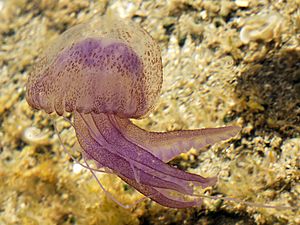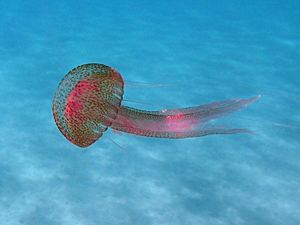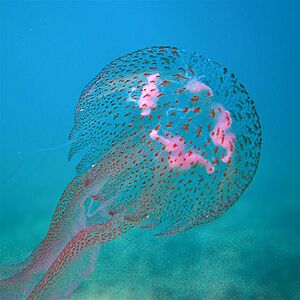Pelagia noctiluca facts for kids
Quick facts for kids Pelagia noctiluca |
|
|---|---|
 |
|
 |
|
| Mediterranean individuals from Sardinia (above) and Corsica (below) | |
| Scientific classification |
|
| Kingdom: | Animalia |
| Phylum: | Cnidaria |
| Class: | Scyphozoa |
| Order: | Semaeostomeae |
| Family: | Pelagiidae |
| Genus: | Pelagia |
| Species: |
P. noctiluca
|
| Binomial name | |
| Pelagia noctiluca (Forsskål, 1775)
|
|
| Script error: The function "autoWithCaption" does not exist. | |
| Synonyms | |
|
|
Script error: No such module "Check for conflicting parameters".
The Pelagia noctiluca is a type of jellyfish. Its name comes from Latin words. Pelagia means "of the sea," nocti means "night," and luca means "light." So, Pelagia noctiluca is a marine creature that can glow in the dark!
This jellyfish is often called the mauve stinger. You can find it in warm parts of the world's oceans. This includes the Mediterranean Sea, Red Sea, and Atlantic Ocean. It also lives in the Pacific Ocean, near places like Hawaii, southern California, and Mexico.
Pelagia noctiluca usually lives far out in the ocean. But sometimes, many of them get washed closer to shore. They can even end up stranded on beaches. Their color can be different shades. They might be pink or mauve, or even golden yellow to tan.
Amazing Glowing Abilities
As its name suggests, the Pelagia noctiluca can bioluminesce. This means it can produce its own light! It gives off light in quick flashes. This happens when the jellyfish is disturbed. For example, a ship moving through the water or ocean waves can make it glow. The flashes are short and slowly fade away.
Impact on Marine Life
Sometimes, large groups of these jellyfish can cause problems. On November 21, 2007, a huge swarm of Pelagia noctiluca jellyfish appeared. This swarm was about 10-square-mile (26 km2) big. It sadly wiped out a salmon farm in Northern Ireland. About 100,000 fish were lost. This shows how powerful nature can be.
Images for kids
-
Individual near Sydney, Australia, currently included in Pelagia noctiluca, but likely an undescribed species
-
Pelagia noctiluca at Elba in the Mediterranean
See also
 In Spanish: Pelagia noctiluca para niños
In Spanish: Pelagia noctiluca para niños
 | DeHart Hubbard |
 | Wilma Rudolph |
 | Jesse Owens |
 | Jackie Joyner-Kersee |
 | Major Taylor |





